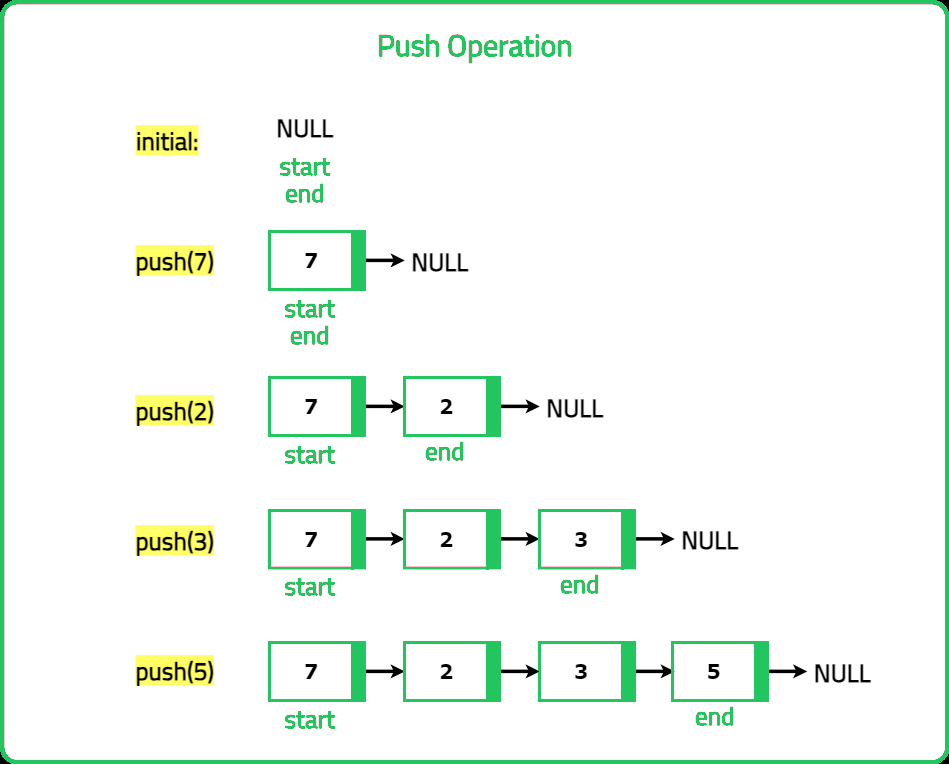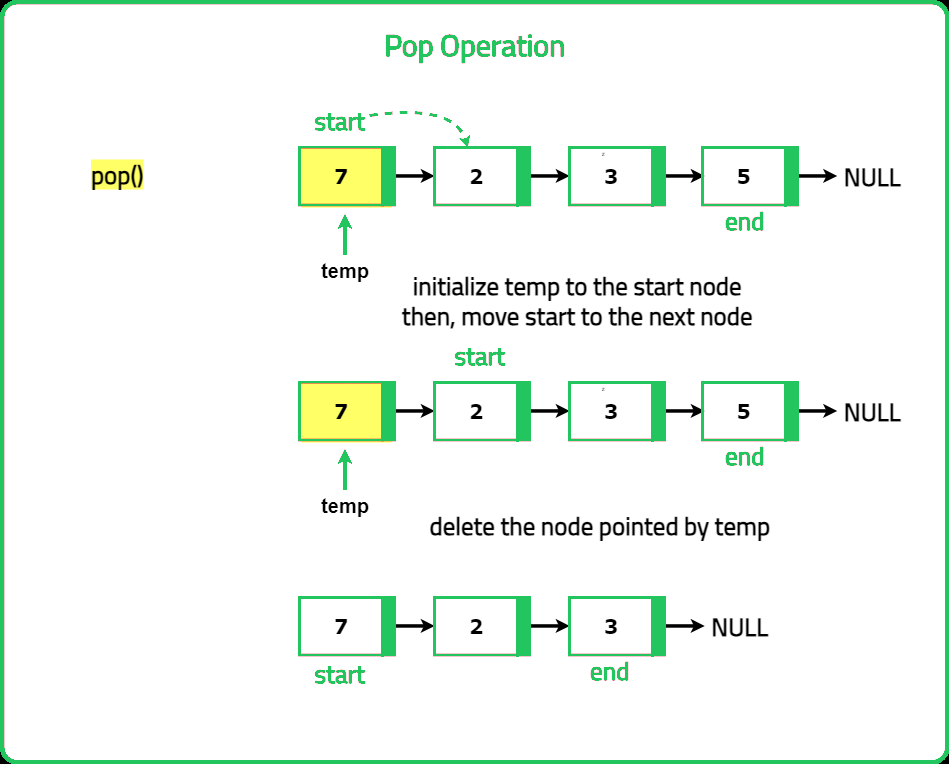123456789101112131415161718192021222324252627282930313233343536373839404142434445464748495051525354555657585960616263646566676869707172737475767778798081828384858687888990919293949596979899100101102103104105
#include <bits/stdc++.h>
using namespace std;
// Node structure
struct Node {
int val;
Node *next;
Node(int d) {
val = d;
next = NULL;
}
};
// Structure to represent stack
class LinkedListQueue {
private:
Node *start; // Start of the queue
Node *end; // End of the queue
int size; // Size of the queue
public:
// Constructor
LinkedListQueue() {
start = end = NULL;
size = 0;
}
// Method to push an element in the queue
void push(int x) {
// Creating a node
Node *element = new Node(x);
// If it is the first element being pushed
if(start == NULL) {
// Initialise the pointers
start = end = element;
}
else {
end->next = element; // Updating the pointers
end = element; // Updating the end
}
// Increment size by 1
size++;
}
// Method to pop an element from the queue
int pop() {
// If the queue is empty
if (start == NULL) {
return -1; // Pop operation cannot be performed
}
int value = start->val; // Get the front value
Node *temp = start; // Store the front temporarily
start = start->next; // Update front to next node
delete temp; // Delete old front node
size--; // Decrement size
return value; // Return data
}
// Method to get the front element in the queue
int peek() {
// If the stack is empty
if (start == NULL) {
return -1; // Top element cannot be accessed
}
return start->val; // Return the top
}
// Method to check if the queue is empty
bool isEmpty() {
return (size == 0);
}
};
int main() {
// Creating a queue
LinkedListQueue q;
// List of commands
vector<string> commands = {"LinkedListQueue", "push", "push",
"peek", "pop", "isEmpty"};
// List of inputs
vector<vector<int>> inputs = {{}, {3}, {7}, {}, {}, {}};
for (int i = 0; i < commands.size(); ++i) {
if (commands[i] == "push") {
q.push(inputs[i][0]);
cout << "null ";
} else if (commands[i] == "pop") {
cout << q.pop() << " ";
} else if (commands[i] == "peek") {
cout << q.peek() << " ";
} else if (commands[i] == "isEmpty") {
cout << (q.isEmpty() ? "true" : "false") << " ";
} else if (commands[i] == "LinkedListQueue") {
cout << "null ";
}
}
return 0;
}
123456789101112131415161718192021222324252627282930313233343536373839404142434445464748495051525354555657585960616263646566676869707172737475767778798081828384858687888990919293949596979899100101
import java.util.*;
// Node structure
class Node {
int val;
Node next;
Node(int d) {
val = d;
next = null;
}
}
// Structure to represent queue
class LinkedListQueue {
private Node start; // Start of the queue
private Node end; // End of the queue
private int size; // Size of the queue
// Constructor
public LinkedListQueue() {
start = end = null;
size = 0;
}
// Method to push an element in the queue
public void push(int x) {
// Creating a node
Node element = new Node(x);
// If it is the first element being pushed
if (start == null) {
// Initialize the pointers
start = end = element;
} else {
end.next = element; // Updating the pointers
end = element; // Updating the end
}
// Increment size by 1
size++;
}
// Method to pop an element from the queue
public int pop() {
// If the queue is empty
if (start == null) {
return -1; // Pop operation cannot be performed
}
int value = start.val; // Get the front value
Node temp = start; // Store the front temporarily
start = start.next; // Update front to next node
temp = null; // Delete old front node
size--; // Decrement size
return value; // Return data
}
// Method to get the front element in the queue
public int peek() {
// If the queue is empty
if (start == null) {
return -1; // Front element cannot be accessed
}
return start.val; // Return the front
}
// Method to check if the queue is empty
public boolean isEmpty() {
return (size == 0);
}
}
class Main {
public static void main(String[] args) {
// Creating a queue
LinkedListQueue q = new LinkedListQueue();
// Array of commands
String[] commands = {"LinkedListQueue", "push", "push",
"peek", "pop", "isEmpty"};
// Array of inputs
int[][] inputs = {{}, {3}, {7}, {}, {}, {}};
for (int i = 0; i < commands.length; ++i) {
if (commands[i].equals("push")) {
q.push(inputs[i][0]);
System.out.print("null ");
} else if (commands[i].equals("pop")) {
System.out.print(q.pop() + " ");
} else if (commands[i].equals("peek")) {
System.out.print(q.peek() + " ");
} else if (commands[i].equals("isEmpty")) {
System.out.print((q.isEmpty() ? "true" : "false") + " ");
} else if (commands[i].equals("LinkedListQueue")) {
System.out.print("null ");
}
}
}
}
123456789101112131415161718192021222324252627282930313233343536373839404142434445464748495051525354555657585960616263646566676869707172737475
# Node structure
class Node:
def __init__(self, d):
self.val = d
self.next = None
# Structure to represent queue
class LinkedListQueue:
def __init__(self):
self.start = self.end = None # Start and End of the queue
self.size = 0 # Size of the queue
# Method to push an element in the queue
def push(self, x):
# Creating a node
element = Node(x)
# If it is the first element being pushed
if self.start is None:
# Initialize the pointers
self.start = self.end = element
else:
self.end.next = element # Updating the pointers
self.end = element # Updating the end
# Increment size by 1
self.size += 1
# Method to pop an element from the queue
def pop(self):
# If the queue is empty
if self.start is None:
return -1 # Pop operation cannot be performed
value = self.start.val # Get the front value
temp = self.start # Store the front temporarily
self.start = self.start.next # Update front to next node
del temp # Delete old front node
self.size -= 1 # Decrement size
return value # Return data
# Method to get the front element in the queue
def peek(self):
# If the queue is empty
if self.start is None:
return -1 # Front element cannot be accessed
return self.start.val # Return the front
# Method to check if the queue is empty
def isEmpty(self):
return self.size == 0
# Creating a queue
q = LinkedListQueue()
# List of commands
commands = ["LinkedListQueue", "push", "push", "peek", "pop", "isEmpty"]
# List of inputs
inputs = [[], [3], [7], [], [], []]
for i in range(len(commands)):
if commands[i] == "push":
q.push(inputs[i][0])
print("null", end=" ")
elif commands[i] == "pop":
print(q.pop(), end=" ")
elif commands[i] == "peek":
print(q.peek(), end=" ")
elif commands[i] == "isEmpty":
print("true" if q.is_empty() else "false", end=" ")
elif commands[i] == "LinkedListQueue":
print("null", end=" ")
123456789101112131415161718192021222324252627282930313233343536373839404142434445464748495051525354555657585960616263646566676869707172737475767778798081828384858687
// Node structure
class Node {
constructor(d) {
this.val = d;
this.next = null;
}
}
// Structure to represent queue
class LinkedListQueue {
constructor() {
this.start = this.end = null; // Start and End of the queue
this.size = 0; // Size of the queue
}
// Method to push an element in the queue
push(x) {
// Creating a node
const element = new Node(x);
// If it is the first element being pushed
if (this.start === null) {
// Initialize the pointers
this.start = this.end = element;
} else {
this.end.next = element; // Updating the pointers
this.end = element; // Updating the end
}
// Increment size by 1
this.size++;
}
// Method to pop an element from the queue
pop() {
// If the queue is empty
if (this.start === null) {
return -1; // Pop operation cannot be performed
}
const value = this.start.val; // Get the front value
const temp = this.start; // Store the front temporarily
this.start = this.start.next; // Update front to next node
this.size--; // Decrement size
return value; // Return data
}
// Method to get the front element in the queue
peek() {
// If the queue is empty
if (this.start === null) {
return -1; // Front element cannot be accessed
}
return this.start.val; // Return the front
}
// Method to check if the queue is empty
isEmpty() {
return this.size === 0;
}
}
// Creating a queue
const q = new LinkedListQueue();
// List of commands
const commands = ["LinkedListQueue", "push", "push",
"peek", "pop", "isEmpty"];
// List of inputs
const inputs = [[], [3], [7], [], [], []];
for (let i = 0; i < commands.length; ++i) {
if (commands[i] === "push") {
q.push(inputs[i][0]);
console.log("null");
} else if (commands[i] === "pop") {
console.log(q.pop());
} else if (commands[i] === "peek") {
console.log(q.peek());
} else if (commands[i] === "isEmpty") {
console.log(q.isEmpty() ? "true" : "false");
} else if (commands[i] === "LinkedListQueue") {
console.log("null");
}
}

